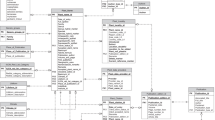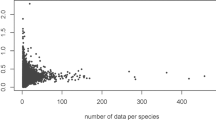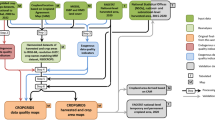Abstract
GERMINATION data are normally published in the form of ‘percentage germination’. These are usually, but not always, accompanied by some information on the time taken for the stated percentage to be reached, a typical example being ‘91 per cent germination in 18 days’1. This method is unsatisfactory for two main reasons: (a) It does not facilitate the comparison of germination data published by two authors. Thus, while it is satisfactory within a single investigation, percentage germination in x days is of little use in comparing different observations except in the unusual case where x is the same in both. (b) It does not indicate the rapidity of germination but only its final extent. Information which may be important from an ecological or horticultural point of view may thus be lost.
This is a preview of subscription content, access via your institution
Access options
Subscribe to this journal
Receive 51 print issues and online access
$199.00 per year
only $3.90 per issue
Buy this article
- Purchase on Springer Link
- Instant access to full article PDF
Prices may be subject to local taxes which are calculated during checkout
Similar content being viewed by others
References
Taylor, C. A., Plant Physiol., 24, 93 (1949).
Author information
Authors and Affiliations
Rights and permissions
About this article
Cite this article
TIMSON, J. New Method of Recording Germination Data. Nature 207, 216–217 (1965). https://doi.org/10.1038/207216a0
Issue Date:
DOI: https://doi.org/10.1038/207216a0
This article is cited by
-
Germination enhancement of Oryza sativa var. Nerica under 2D-clinostat induced microgravity environment
Plant Growth Regulation (2023)
-
ScreenSeed as a novel high throughput seed germination phenotyping method
Scientific Reports (2021)
-
Increments in weed seed size track global range expansion and contribute to colonization in a non-native region
Biological Invasions (2020)
-
Plant-derived smoke induced activity of amylases, DNA replication and β-tubulin accumulation before radicle protrusion of dormant Avena fatua L. caryopses
Acta Physiologiae Plantarum (2017)
-
Phytotoxic effects of volatile organic compounds in soil water taken from a Eucalyptus urophylla plantation
Plant and Soil (2014)
Comments
By submitting a comment you agree to abide by our Terms and Community Guidelines. If you find something abusive or that does not comply with our terms or guidelines please flag it as inappropriate.



